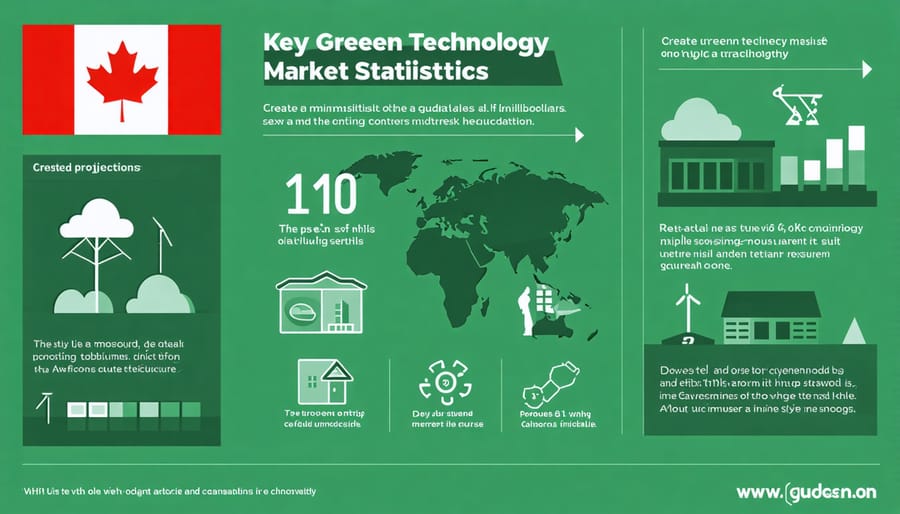The global green technology and sustainability market stands at a pivotal turning point, projected to reach $417.35 billion by 2030, presenting unprecedented opportunities for Canadian businesses and investors. From renewable energy solutions to sustainable infrastructure development, this sector’s rapid expansion reflects a fundamental shift in how companies approach environmental challenges and market opportunities.
Canadian firms are uniquely positioned to capitalize on this growth, leveraging our nation’s robust cleantech ecosystem and pioneering research institutions. Success stories like Toronto-based Li-Cycle, which revolutionized battery recycling technology, and Vancouver’s Carbon Engineering, leading in direct air capture solutions, demonstrate the market’s vast potential for innovation and profitability.
The convergence of environmental urgency, technological advancement, and supportive government policies has created a perfect storm for green technology adoption. With federal commitments to reduce greenhouse gas emissions by 40-45% below 2005 levels by 2030, the demand for sustainable solutions continues to surge across sectors. For businesses and investors, this translates into tangible opportunities in renewable energy, waste management, sustainable transportation, and green building technologies.
This transformative market landscape offers not just environmental benefits but compelling financial returns, making green technology investments increasingly attractive to forward-thinking Canadian enterprises and global partners alike.
The Booming Green Technology Market Landscape

High-Growth Green Tech Sectors
The Canadian green technology sector continues to experience remarkable growth, particularly in three key areas. Renewable energy leads the pack, with solar and wind power installations increasing by 35% annually across the country. Notable success stories include Ontario’s Bruce Power, which has pioneered innovative clean energy solutions while creating thousands of green jobs.
Electric and hydrogen-powered transportation represents another rapidly expanding sector, with Canadian companies like Lion Electric and Ballard Power Systems leading the charge. The sustainable transportation market is projected to reach $75 billion by 2025, driven by government incentives and growing consumer demand for eco-friendly vehicles.
Sustainable waste management solutions represent the third major growth area, with Canadian municipalities adopting innovative technologies for waste reduction and resource recovery. Companies like TerraCycle Canada and Enerkem are transforming waste management practices through advanced recycling technologies and waste-to-energy solutions.
These sectors not only offer significant investment opportunities but also align with Canada’s commitment to reducing greenhouse gas emissions and creating a more sustainable economy. Industry experts predict continued expansion in these areas, supported by federal and provincial green initiatives.
Market Entry Opportunities
Canadian businesses have several promising entry points into emerging green technology markets. Developing economies, particularly in Southeast Asia and Latin America, present significant opportunities for renewable energy solutions and sustainable infrastructure development. These markets are actively seeking expertise in areas where Canadian companies excel, such as smart grid technology, waste management systems, and clean energy solutions.
Strategic partnerships with local businesses have proven successful for Canadian firms. For example, Vancouver-based cleantech company Westport Fuel Systems successfully entered the Indian market through joint ventures with local manufacturers. This approach combines Canadian innovation with local market knowledge and existing distribution networks.
Government incentives and support programs in target markets create additional opportunities. Many emerging economies offer tax benefits, grants, and streamlined approval processes for sustainable technology projects. Canadian businesses can leverage these incentives while bringing their proven expertise in areas like water treatment, energy efficiency, and sustainable building technologies.
The most promising sectors include electric vehicle infrastructure, renewable energy storage solutions, and smart city technologies. These align well with Canadian technological capabilities and the growing demand in emerging markets for sustainable urban development solutions. Market entry through pilot projects and demonstration initiatives often provides a solid foundation for longer-term expansion.
Success Stories: Canadian Green Tech in Action
Innovation Spotlight
Canadian innovators are leading the charge in sustainable technology development, with several groundbreaking solutions gaining international recognition. Vancouver-based Carbon Engineering has revolutionized carbon capture technology, developing direct air capture facilities that can remove CO2 from the atmosphere at an industrial scale. Their innovation has attracted significant investment and partnerships across North America.
In Ontario, Hydrostor has pioneered Advanced Compressed Air Energy Storage (A-CAES) technology, providing a cost-effective solution for long-duration energy storage. This innovation helps integrate renewable energy sources into the power grid more efficiently, supporting Canada’s transition to clean energy.
Montreal’s Pyrowave has transformed plastic recycling through its microwave-based chemical recycling technology. This breakthrough aligns with growing circular economy initiatives and has secured partnerships with major international corporations.
GHGSat, another Montreal-based company, operates high-resolution satellites that monitor greenhouse gas emissions from industrial facilities worldwide. This technology enables businesses and governments to track and reduce their environmental impact more effectively.
These innovations demonstrate Canada’s leadership in clean technology and create significant export opportunities. According to Innovation, Science and Economic Development Canada, our cleantech sector is projected to contribute over $28 billion annually to the economy by 2025, positioning Canadian businesses at the forefront of the global sustainability revolution.

Partnership Models
Successful partnerships in emerging green technology markets often leverage complementary strengths between Canadian and international organizations. Joint ventures have proven particularly effective, with Canadian companies providing technical expertise while local partners contribute market knowledge and established networks.
A prime example is Vancouver-based GreenTech Solutions’ collaboration with Indian manufacturers to develop solar technology solutions. This partnership model has accelerated market entry while ensuring products meet local requirements and price points. Similarly, several Canadian cleantech firms have found success through technology licensing agreements, particularly in Southeast Asian markets.
The most effective partnerships often start with pilot projects, such as those seen in urban sustainability programs, allowing partners to test compatibility and refine their approach before scaling up. Industry experts recommend structured knowledge-sharing agreements that protect intellectual property while facilitating necessary technology transfer.
Government-backed initiatives, including those through the Trade Commissioner Service, have helped facilitate these partnerships by providing matchmaking services and risk mitigation support. Companies like Montreal’s EcoSolutions have successfully utilized these resources to establish manufacturing partnerships in Brazil, demonstrating how public-private collaboration can reduce entry barriers.
For optimal results, Canadian businesses should prioritize partners who share long-term sustainability goals and demonstrate commitment to environmental standards, ensuring alignment with both market objectives and green technology principles.

Navigating Implementation Challenges
Regulatory Compliance
Navigating regulatory compliance in the green technology sector requires a thorough understanding of evolving environmental standards across different markets. In Canada, companies must adhere to federal regulations such as the Canadian Environmental Protection Act (CEPA) and provincial-specific requirements, which set benchmarks for emissions, waste management, and sustainable practices.
The Government of Canada’s Environmental and Climate Change department has established clear guidelines for businesses operating in the green technology sector. These include mandatory reporting of greenhouse gas emissions, compliance with energy efficiency standards, and adherence to clean technology innovation protocols.
For Canadian businesses expanding internationally, understanding regional variations in environmental regulations is crucial. The European Union’s stringent environmental policies, including the EU Green Deal, often set global standards. Meanwhile, emerging markets may have different compliance requirements, though many are rapidly adopting international standards.
Key compliance areas include:
– Carbon emissions reporting and reduction targets
– Waste management and recycling protocols
– Energy efficiency standards
– Product lifecycle assessments
– Supply chain sustainability verification
Success in the green technology market often depends on staying ahead of regulatory changes. Canadian companies like CarbonCure Technologies have excelled by not only meeting but exceeding compliance requirements, creating competitive advantages in international markets. Regular consultation with environmental compliance experts and industry associations can help businesses navigate this complex regulatory landscape while identifying opportunities for innovation and growth.
Technology Adaptation
Successful implementation of green technology requires careful adaptation to local market conditions and community needs. Canadian companies have demonstrated remarkable success in customizing sustainable solutions, particularly through innovative waste reduction strategies that consider regional infrastructure and cultural practices.
Key adaptation strategies include modifying technology specifications to match local power grid capabilities, adjusting operational processes to accommodate available workforce skills, and incorporating indigenous knowledge where applicable. Companies like GreenShift Technologies in Vancouver exemplify this approach by developing scalable solar solutions that consider varying climate conditions across different provinces.
Market research and community engagement play crucial roles in successful adaptation. Before deployment, businesses should conduct thorough assessments of local regulations, available resources, and existing infrastructure. This approach has proven particularly effective in rural communities, where simplified maintenance requirements and robust design features ensure long-term sustainability.
Partnership with local organizations and educational institutions helps bridge knowledge gaps and ensures smooth technology transfer. The Clean Technology Trade Alliance reports that companies implementing collaborative adaptation strategies experience 40% higher success rates in new market entry compared to those using standardized approaches.
Cost considerations must balance affordability with functionality, often requiring innovative financing models and strategic partnerships to maintain economic viability while meeting sustainability goals.
Support Systems and Resources
Canada offers robust support systems and resources for businesses venturing into green technology and sustainability markets. The federal government’s Strategic Innovation Fund provides significant financial backing, with dedicated streams for clean technology projects and sustainable initiatives. Through Natural Resources Canada (NRCan), businesses can access grants ranging from $50,000 to $5 million for innovative clean technology development and deployment.
Provincial programs complement federal support, with organizations like Ontario’s Green Investment Fund and British Columbia’s Innovative Clean Energy (ICE) Fund offering region-specific funding opportunities. The Business Development Bank of Canada (BDC) provides specialized loans and advisory services for cleantech companies, including their Cleantech Practice program which has committed $600 million to support scalable cleantech firms.
Industry networks play a crucial role in fostering innovation and collaboration. The Canada Cleantech Alliance connects entrepreneurs with mentors, investors, and potential partners across the country. Smart Prosperity Institute offers valuable research and policy insights, while Sustainable Development Technology Canada (SDTC) provides both funding and networking opportunities for cleantech innovators.
For early-stage companies, accelerators like MaRS Cleantech and Foresight Canada offer specialized programs combining mentorship, market access support, and connections to capital. The Clean Growth Hub serves as a single window for clean technology producers and adopters to navigate government programs and services.
These support systems are complemented by tax incentives, including the Scientific Research and Experimental Development (SR&ED) program, which offers tax credits for eligible R&D activities in clean technology. Additionally, Export Development Canada provides specialized financing and insurance solutions for companies looking to expand their green technologies into international markets.
Success stories like CarbonCure Technologies, which received support through multiple government programs to scale its CO2-utilization technology, demonstrate the effectiveness of these support systems in nurturing Canadian cleantech innovation.
The Canadian green technology and sustainability market stands at a pivotal moment of unprecedented growth and opportunity. As global demand for sustainable solutions continues to rise, Canadian businesses are uniquely positioned to become leaders in this transformative sector. The combination of supportive government policies, robust innovation ecosystems, and growing investor interest creates a strong foundation for success.
Looking ahead, several key trends will shape the industry’s trajectory. The increasing adoption of clean energy solutions, circular economy practices, and sustainable manufacturing processes will drive market expansion. Canadian companies that focus on developing scalable, innovative solutions while maintaining strong environmental, social, and governance (ESG) principles will find themselves well-positioned for both domestic and international success.
Recent success stories, such as Lion Electric’s expansion and Carbon Engineering’s breakthrough technologies, demonstrate the potential for Canadian firms to make significant global impacts. The continued growth of cleantech hubs in Vancouver, Toronto, and Montreal further strengthens Canada’s competitive advantage in the global market.
For businesses considering entry or expansion in the green technology sector, the time to act is now. With projected market growth rates exceeding 20% annually over the next decade, early movers will have distinct advantages. By leveraging Canada’s natural resources, technical expertise, and supportive business environment, companies can contribute to environmental sustainability while building profitable, future-proof enterprises.
